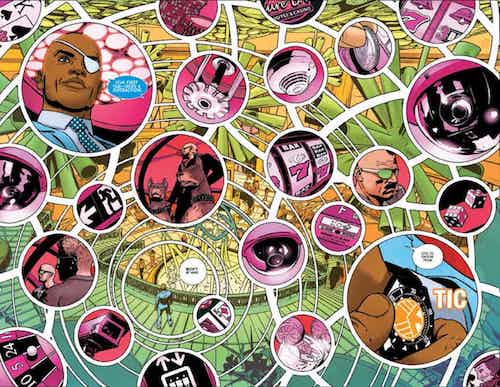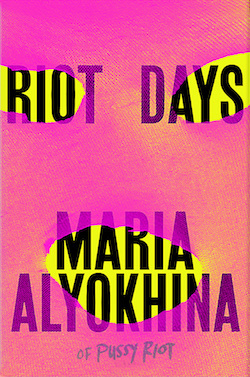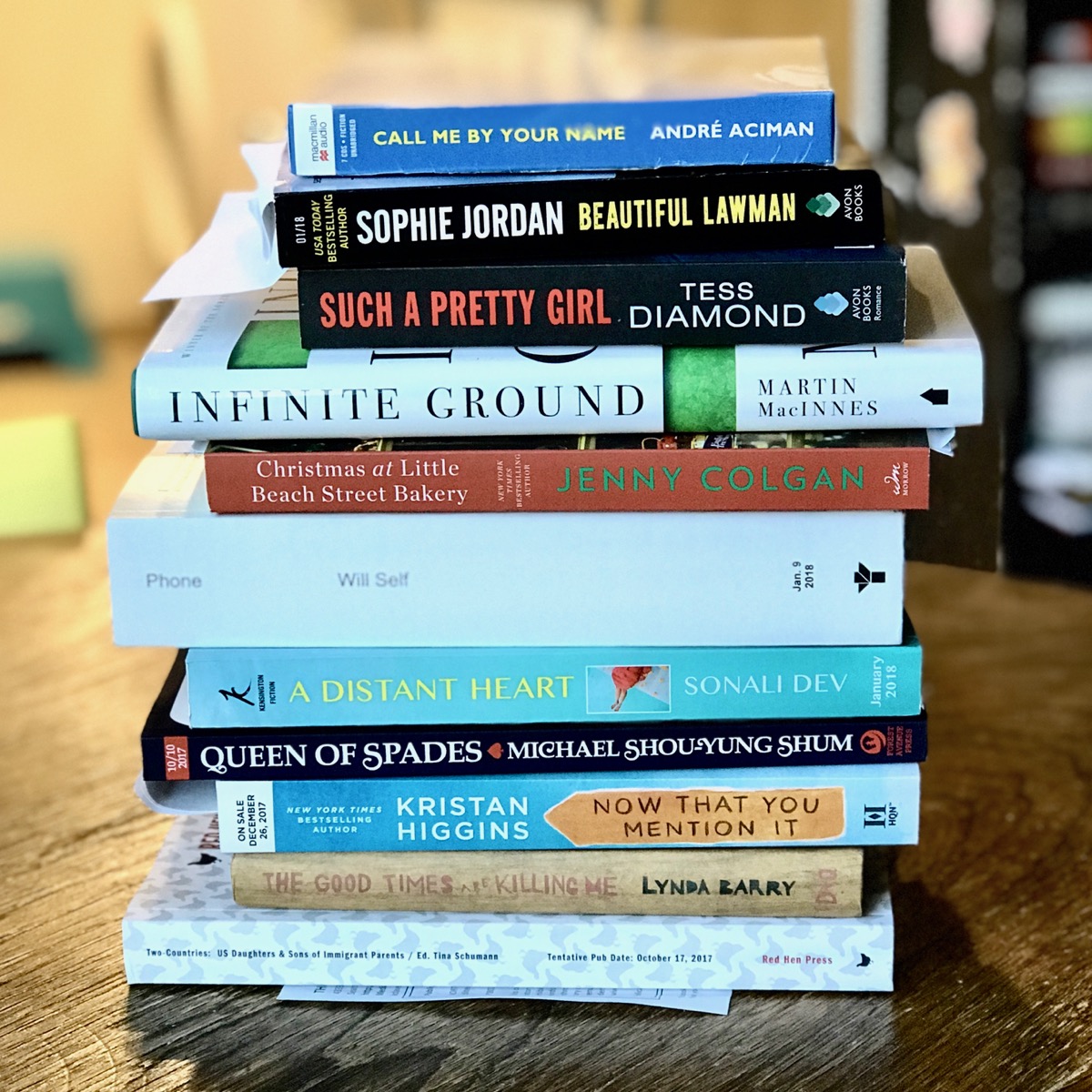The Sunday Post for October 1, 2017
Each week, the Sunday Post highlights a few articles good for slow consumption over a cup of coffee (or tea, if that's your pleasure). Settle in for a while; we saved you a seat. You can also look through the archives.
How to Protest Without Offending White People
Michael Harriot has a brutal takedown of the response to the #takeaknee protests that just builds and builds relentlessly. An effective call for awareness (and call to arms) even for white people who supported the protests wholeheartedly.
Any mention of race is divisive because it overlooks the fact that every color and creed has problems. Some people have to worry about the leader of the free world trying to deport their children, vilifying their religion or referring to their mothers as bitches, while others have to live with the terrible burden of people constantly belittling their chicken seasoning and potato-salad-making.
We all have a struggle.
The Polar Expedition That Went Berserk
Recruited by Jarle Andhoy, a madman and self-proclaimed modern-day Viking, 18-year-old Samuel Massie miraculously survived an Antarctic expedition that cost three men their lives. Blair Braverman — who tells their story — drove sled dogs in Norway, led tours of the Alaskan glaciers, and has “adventurer” in her bio. You can feel her passion for the Earth’s most dangerous wild places, and her compassion for those who enter them, in this piece about an otherwise completely insane attempt at the South Pole.
When they left their final port in New Zealand, the Berserk carried five men and ten tons of equipment, including the ATVs, two kayaks, a dinghy, tents, metal ladders for bridging crevasses, food to last them six months, and matching wool socks and skull-and-crossbones hats knit by Robert’s grandmother. They were heading toward the most dangerous waters in the world, where waves could rise 80 feet, three times the length of the 27-foot boat. With the extra gear, the Berserk was top-heavy — but not, they hoped, enough to tip over and drown them. To this day, nobody knows if they were right.
Keepers of the Secrets
Book archeology! In his profile of Thomas Lannon, archivist at the New York Public Library, James Somers investigates “BookOps” and the meticulous and brilliant people who transform the crumpled, the stuck-together, and the barely readable into the story of a city: the man whose existence was recorded only through a passing mention in a young socialite’s diary; the source material for the best-selling Killers of the Flower Moon.
This essay is a celebration of patience, a lesson in the ethics of information, and a reminder that the Internet, while vast, is not yet the sum total of what we can know.
That is the paradox of being an archivist. The reason an archivist should know something, Lannon said, is to help others to know it. But it’s not really the archivist’s place to impose his knowledge on anyone else. Indeed, if the field could be said to have a creed, it’s that archivists aren’t there to tell you what’s important. Historically momentous documents are to be left in folders next to the trivial and the mundane — because who’s to say what’s actually mundane or not?
"Megyn Kelly Today" Is Not Going Well
I know it’s wrong to enjoy it when other people tank, hard — but hey, we’re only human. Kate Aurthur traces the not-so-gentle failure of Megyn Kelly’s new show, Megyn Kelly Today. If any of the criticisms in this piece — which include a suggestion that stars might be tricked into guesting, and an anecdote in which Jane Fonda cuts Kelly right off at the knees — seem harsh, remember that Kelly is reaping what she’s sown.
Does some of the disdain for Kelly come from her Fox News past haunting her? Are any of these people thinking of when she said, "For all you kids watching at home, Santa just is white"; or her "racist demagoguery," in Jamelle Bouie's words; or, in the case of Fonda, resuscitating the image of "Hanoi Jane," just to stoke the Fox News base? I do wonder. Because even if the left projected feminist hero status on Kelly after she was the object of Trump's ire and for arguably being the final nail in Roger Ailes' coffin, she is still largely a cypher.
If you’re a better person than I am, instead read this piece about how stupid-smart our televison-addict president is. Despite that description, it is less a takedown than a considered argument about post-literacy and the difference between deliberative and performative culture.
RIP The Broccoli Tree
Jason Kottke rips our hearts out in a handful of words, eulogizing a beautiful tree with a silly name. Patrik Svedberg has been photographing the Broccoli Tree for several years, in a series of images that show the tree in all its glory and humanity in all of ours. Until a recent act of vandalism, that is. RIP, Broccoli Tree.
Seattle Writing Prompts: A destroyed plant; a moment
Seattle Writing Prompts are intended to spark ideas for your writing, based on locations and stories of Seattle. Write something inspired by a prompt? Send it to us! We're looking to publish writing sparked by prompts.
Also, how are we doing? Are writing prompts useful to you? Could we be doing better? Reach out if you have ideas or feedback. We'd love to hear.

I saw what happened here. I know why this planter, which sits in front of a building on 4th between Pike and Union, was harassed. Why flowers were on the ground mixed with sprays of clinging soil. I know because I saw it, while walking with some co-workers, to food one afternoon at lunch.
But imagine I didn't know. Or, better yet, imagine I won't tell you. We stumble on these little dramas every day in the city, places where a moment has taken place and we are witnessing only its aftermath.
This plant is but one small example of this. How many times have we seen the trashcan knocked over, the car on the sidewalk, the stripped bike frame locked to a pole, broken glass, tufts of weird fur, a spill or spray of blood. The city has stories, we know that. That's what this column is about. But sometimes, the city has moments, too.
I would define a moment as the peak of a story, or a peak in a story, maybe, since a story may have many peaks as it climbs towards resolution. That time where all the threads a writer has been pulling come together in a sharp shock. When the deceit and betrayal get played, when the pressure from all around rises to a fever pitch and a character just can't take it anymore, and something changes in an irrevocable moment of action. See, for reference, Chekov's Gun.
Life is full of such moments, but they're rarely as clean and simple as flowers on a sidewalk, obviously the victim of some kind of violence. The question I want to know is: what lead to it happening? What was the sharp rise before the moment. And if this given moment (flowers tossed on the sidewalk) is the same in each story, what was the buildup? What could have lead to it?
Let's try to explore what could have been.
Today's prompts
"You're a total good boy," she said to him, smiling. They had gone downtown after school, the two of them. They ran in different crowds, but when the rest of the crew had split off, they were left together, and that suited both of them just fine. "What? No. I mean, what?" he said. "You get good grades. Don't hang out with losers. Want to, like, go to college. I dunno. You just seem kind of simple." She laughed at her own boldness. "What!?" he said, with faux anger. "I'm a total rebel." She laughed harder, and making like an ape, scratching his underarms, he went over to the planter and ripped flowers to throw at her, while she shrieked, shocked and delighted by his boldness.
The dress was as much as a down payment on a house. And the two words that Candy would not accept were "No returns." But there she was at the dress shop, and there was the calm clerk explaining to her that she just lost that money forever, invested in couture that, now, would never get its day. That never would walk an aisle. That never would be photographed. The cake, she canceled. The hall refunded her down payment. The caterer booked with someone else. But the dress shop? No returns on bespoke designer dresses. She was fucked. And storming out the front door, she saw those stupid potted flowers, and could only think of one visceral way to express her anger at this situation.
It mostly was in the corner of her eye. She couldn't see it when she looked directly at it, but she had been tracking it around downtown for hours. If it got away from her, if she couldn't catch it, then it could spell the end of the world as we knew it. She almost had it near Westlake, until a security guard started harassing her and she had to bide her time. She saw its silvery shimmer dive into a planter on the side of the road, and that is where she made her play, springing on it and grabbing it, and fist fulls of flower, in an attempt to end this once-and-for-all.
Joe dog, a terrier, was chill. Walking down the street was a nice thing, on his leash with his dad, just having a nice morning, enjoying the smells of the city. Then, right before you know it, he smelled it. Rat. A fat, ugly, stinky rat. Salivating, not from hunger but from desire, Joe went calm. Years of breeding told him he had to stay still and not project his move. The rat may have been aware of him, but it didn't know what he was capable of. And then, walking right by the planter, Joe made his move. His dad yelled "Joe, no!" as he lunged, pulling the leash with him. Going straight for the planter. But the rat was too quick for him, and Joe ended up, only, with a mouthful of flowers that he shook and cast all over the ground. His dad, embarrassed, grabbed his leash and pulled him away quickly. That rat, though, mocked him. Stood on the edge of the planter as he was pulled away and laughed. Next time, thought Joe. Next time.
There are so many angry men in this world, and he was but one. Men are angry for reasons. A song once said "an angry man needs attention," and that is true. Anger is about attention. It is disgust in not being recognized the way you want, and making a show so the world will correct itself and focus its attention on you. It is a selfish act, and it can be a violent act, because the man is crying out "I am so lonely that even if you give me fear, you are still giving me the attention I desire." The angry man can't see that his actions are damaging to the relationship. He would do better to be vulnerable, and to say to the people hurting him "I need your attention. I'm in pain, and I don't know what to do." Anyway, that's the story of the flowers. It was an angry man, yelling gender-specific insults at an unnamed woman. He was storming down the street, and stopped by the potted plant, ripping great fist fulls of flowers and dirt, raising them above his head like down-on-his-luck Thor, and throwing them with violence at the ground. He stormed off, all of us giving him a wide berth, and then he was gone and only the spill of flowers, as a testament to his emotions, lay behind for someone else to clean up.
September's Post-it note art from Instagram
Over on our Instagram page, we're posting a weekly installation from Clare Johnson's Post-it Note Project, a long running daily project. Here's her wrap-up and statement from September's posts.
September's Theme: Another September
I can’t shake the feeling that September is when years end and start. The season turning into fall always makes me think of old years and time passing. This group of post-its all look back at another September, from a dramatically terrible time in my life. 2014 was personally brutal, terrifying, but my post-its that September seem pretty normal. Many of them don’t really talk about what was going on, but I see glimpses of things I was trying to find comfort in. I was watching Only Lovers Left Alive, which turned out to be the last movie I ever rented from On 15th Video. I went there from childhood, renting old movies with my parents, through my teenage years, watching all the queer films I could find over and over, and into adulthood; I didn’t know when I made the post-it that the store would close forever at the end of that week. I was getting happily soaked in rain that I’d forgotten would ever come back, and stubbornly continuing my daily swim in Lake Washington even after it had been abandoned by everyone else. The beach was so empty that someone was trying to shelter there on a bed of newspaper pages; when I saw they were full of splashy ads for a Seattle Art Museum exhibit called “City Dwellers” it felt like we were strangers let in on some sad lonely joke. Even in an awful year I know how lucky I am, how vulnerable things are, how much I need to thank someone for.
I've read plenty of ebooks on a Sony Reader and on my phone and my iPad, but I've never read a book on my laptop. This book is trying to be my first browser-based read:
Poetic Computation: Reader is an online-book by Taeyoon Choi that discusses code as a form of poetry and aesthetic while raising ethical questions associated with it.... Designed by HAWRAF, Poetic Computation: Reader presents new possibilities for enhanced accessibility and legibility in web browsers. Readers can change the design elements and format parameters to create their ideal reading experience.
This book, at the very least, is gorgeous. The design controls are easy to understand. And I'm interested in the idea of a book about the blurring lines between poetry and code. So we'll see how this goes.
The Help Desk: Putting the "no" in "novelty books"
Do you need a book recommendation to send your worst cousin on her birthday? Is it okay to read erotica on public transit? Cienna Madrid can help. Send your Help Desk Questions to advice@seattlereviewofbooks.com.
Dear Cienna,
My husband's family knows I love books, so the problem is that they buy me books. Why is it a problem? Because every book they buy me is some cheap-ass novelty front-of-store yuk-yuk book, with titles like "Sports Facts for the Throne Room" or "Matza Ball Mama's Life Tips for the Soul" or something gross that. I have a collection of these monstrosities, all printed on yellowing pulp rag, all with horrible line illustrations, and all with grade-B humor or schlocky advice.
So what do I like to read? Everything! If they just asked a bookseller "what's a good book for my daughter-in-law?" They'd do fine. Seriously.
But they're nice people, and confessing now that I'm ungrateful and overly polite would be an insult. What should I do?
Missy, Monroe
Dear Missy,
Normally I'm not an advocate for punting problems to someone else, but this problem is not yours, it is your husband's. Having lived through the dawn and death of my mother's three marriages and the marriages of several close friends, I have observed what it takes to build a successful partnership: don't keep secret families in neighboring towns – or at least don't add them to your primary family's Costco membership; don't marry my mother; and be prepared to actually step up and be a partner.
Your husband's family means well – they want to give you thoughtful gifts. But they don't live with you; your husband does. They don't know your taste in books; your husband should. They're not your family, they are your husband's.
If your husband knows his family sucks at gift giving, it's his job to step in and handle the situation so you don't look like a picky ingrate. Give your husband a list of books or authors that you would like to read and tell him to casually pass it along to his family, as in "I overheard Missy talking about really wanting to read these author/books if you need gift ideas," not "Missy hates the books you buy her, so here – buy her one of these."
If the next birthday or holiday rolls around and you're still stuck with pulp, your husband should tell his family you're going giftless for future holidays and to donate to a selected charity instead. And if he simply can't be bothered to act as intermediary between you and his family, check your Costco account and think hard about what "partnership" means to you.
Kisses,
Cienna
Holy cow: Amazon announced yesterday that they're adapting Seattle author Neal Stephenson's sci-fi classic Snow Crash into a TV series. And they also announced that they're adapting Portland comics writer Greg Rucka's comic with artist Michael Lark, the dystopian bioengineering epic Lazarus, as a series, too. And they also announced that they're adapting Larry Niven's Ringworld series into a TV series. I can't say that I think Snow Crash should be a series — I don't even know if it would be an effective movie; I think it's better left as a novel that was ahead of its time when it was published — but the other two are ripe for serialized storytelling. As much as I hate to admit it, I think Amazon's television arm is really on to something here.
Portrait Gallery: Maria Alyokhina
Each week, Christine Larsen creates a portrait of a new author for us. Have any favorites you’d love to see immortalized? Let us know

Saturday, September 30: Riot Days Reading
Maria Alyokhina was fighting Putin years before your grandmother put on a pussy hat and started writing long Facebook rants about fighting Putin. As a member of Pussy Riot, Alyokhina spent two years in jail for her anti-Putin protests, and her memoir of her time as a Pussy Rioter will likely inspire some American women to fight a little nastier.
Elliott Bay Book Company, 1521 10th Ave, 624-6600, http://elliottbaybook.com . Free. All ages. 7 p.m.
Annus Venereus
(with apologies to Philip Larkin)
Contemporary romance peaked
In nineteen-fifty-eight
(Which of course was rather late)
When mousy Midtown office girls
Sought out rich men to date.Now, since then there’s only been
A sort of echoing
Of Heyer’s style of thing;
A virgin beauty’s quest to find
A duke for marrying.For all at once, the smut appeared:
Everyone fucked the same
And every book became
A drenched and dizzy bacchanal
Quite free from tact or shame.So books were never better than
In nineteen-fifty-eight;
And now is far too late
For those mousy Midtown office girls
And the wealthy men they date.
One bookstore (re)opens, one bookstore closes
- Here's is a last-minute event that just delivered itself to our attention: Horizon Books, the used bookstore on Capitol Hill that recently closed, is now having a grand re-opening sale on Friday from 6 to 10 pm. The Facebook invite says:
Friends! Horizon Books is proud to re-open it's doors. We'd love to invite friends, community members and book lovers of all stripes to come and celebrate our re-opening party and sale. Come say hi to Don, Dave or Brandon, and see the new lay out.
For the one night only, everything under $20 will be %50 off, and include a huge range of free, dollar, $3 and $5 books, with the hope of clearing enough space to start shuffling off some dust, and clearing a few extra boxes out of the way.
Horizon will have a sale for the whole month of October, so drop by and see what they've got onhand.
Remember: Seattle Mystery Bookshop is closing forever on Saturday, September 30th. Go and say goodbye to one of the best bookstore staffs that Seattle has ever seen. We've been writing about Seattle Mystery Bookshop since the very beginning of our site, and we've always been in awe of their bookselling ability. I'll miss them very much.
Thursday Comics Hangover: Too beautiful for this world
Aside from Ms. Marvel, my favorite Marvel title these days is Nick Fury, a spy comic written by James Robinson and drawn by the acronymical comics artist ACO. Fury is unlike just about everything else Marvel is putting out these days: every issue is its own stand-alone adventure, every page is visually adventurous, and the book isn't interested in crossovers or events.
Fury is a smart callback to the stylish Nick Fury: Agent of SHIELD book that Jim Steranko drew for Marvel during the late 1960s. It's not an homage, or a rigid tribute book: instead, it imagines what those SHIELD books would look like if they were drawn today. The result is a splashy, vivid, wildly attractive book that feels like a rich hit of pure comic joy. (Of course, Fury is not as subversive as Steranko's run, which still stands as some of the sexiest issues published by a mainstream American comics publisher. Fury is, unfortunately, rather sexless.)
The most recent issue of Fury, number 6, was published yesterday, and it continues the formula established in the previous five issues: Fury is on a mission in some exotic locale (this time he's in gothic Scotland) and he tangles with evil agents of Hydra. There's a plot twist that's so easy to predict it must have been planned that way, but that's not really what the book is about, in any case.
Robinson seems to have smartly designed this book to show off what ACO can do. A two-page spread reveals a hummming "Hydra enclave" buried underground, and ACO depicts a buzzing base full of drones and weird laser devices and all kinds of mysterious tanks full of evil stuff being carted around. Later, ACO delights in taking the whole base apart, piece by piece, as Fury unravels their plans. I haven't stared this intently at pages of art from one of the big two publishers in a very long time. Here's a spread from an earlier issue of the comic, which shows Fury examining every possible threat on a wide-open casino floor:

Unfortunately, the last page of Fury delivers some bad, if predictable, news: number 6 is the final issue. It figures: Fury was too beautiful to live in this world. Hopefully, ACO will land a gig that offers the superstar status he deserves. Until then, lovers of over-the-top spy fiction will have to keep their spirits up with the trade paperback collecting every issue of Nick Fury, which is due out this December.
Robert Gottlieb is obviously smitten
Respected editor Robert Gottlieb has written 3000 words of a romance roundup for the New York Times. Let me save you some trouble and quote this bit from the end: “Its readership is vast, its satisfactions apparently limitless, its profitability incontestable. And its effect? Harmless, I would imagine. Why shouldn’t women dream?” This is the kind of approval we women can fucking do without.
Then he adds: “After all, guys have their James Bonds as role models.” Let’s chew over this allusion a bit for digestion’s sake. The Bond fantasy: a handsome, powerful, wealthy man with cutting-edge tech somehow succeeds at world-saving espionage while seducing a string of beautiful women. The romance fantasy: an ordinary woman can find a man who thinks she’s beautiful, and who offers her earnest support and reliable orgasms. Our reviewer believes these two hopes are equally fanciful and unlikely in real life. Honestly it’s a little heartbreaking, a tragedy of lowered expectations.
It is easy to be wrong about romance. It happens like clockwork every Valentine’s Day (which is when I expected to be writing a piece like this). But to be so consistently, condescendingly, creatively wrong about romance takes real talent. Every paragraph merits its own corrective essay – the estimates of the “hundreds, perhaps thousands” of romances to be published this fall, his review of the book that made it clear the characters were black but “you’d never know it” because apparently they act just like normal people, the total absence of m/m or f/f romance to complicate his stuck-in-midcentury gender readings of the genre.
But there is hope for the reviewer yet. Can I tell you what’s really happening here? In the thicket of errors, mistaken assumptions, and Wikipedia-level research, one other pattern comes to the fore: a series of small, subtle hints that Robert Gottlieb is going to end up a romance fan in spite of himself.
- He’s quoting the sex scenes at length and with evident relish. This is Stage One of Reluctant Fandom, though admittedly some people never mature past this phase. A great many readers discover romance in our teens – the sex is a key source of fascination, to the point where decades later we can still cite the page numbers where the good bits happen.
- He’s most drawn to the romances he can personally identify with. This is how it gets you. I’m not entirely sure Robert Gottlieb is aware this is happening – but he waxes enthusiastic over a midcentury romance set at a publishing house, a book by the daughter of a respected literary poet, and a cozy Christmas romance with an older hero and heroine (admittedly exciting to hear about in this youth-obsessed genre). In this last, he takes a break from quoting sex scenes and starts sharing lines about the food, aka Reluctant Fandom Stage Two. His description of a set of Debbie Macomber books also has that breathless-summary quality of someone who just has to tell you all the crazysauce things that happened in this book he just read. Later he does the same with a new Danielle Steel historical. At this point someone really oughta send him Sherry Thomas’ Delicious, or Prince of Midnight by Laura Kinsale.
- He likes Tessa Dare. He starts quoting the heroine’s best lines from The Duchess Deal. He’s so close to getting hooked. I’m on the edge of my seat. Just a little farther, dear, the water’s fine…
- But hark, what sound perfumes the languid evening air? It is the siren call of sequelbait, and Robert Gottlieb is helpess to resist: “I’m absolutely certain that lawyer Connie is going to end up with Jonathan of the Bolognese.” Folks, he’s totally going to read the next book in this series.
- He’s taking romance moral lessons to heart: “A lick and a nibble are all to the good, but complete honesty is essential. All truths must be told, especially by the man.” We should perhaps expect a bit of irony from someone who used to run the New Yorker, but the fact that he’s already distilling the books into practical moral lessons means he’s farther down the road of internalizing them than he might perhaps care to admit.
At first blush, I admit I bristled too hard at the patronizing tone of the review to see what Robert Gottlieb was really going through. Rage and a righteous zeal made me close-read. By the time I hit that “harmless” for the second time, I wanted only to pat him on the head and tell him, sweetie, it’s okay. You don’t have to be scared. Because you see, romance is only mostly harmless. For a genre that makes its promises upfront, it has a sneaky way of sidling up on a person and making itself indispensable. It will take careful guidance and the right book recommendations for Robert Gottlieb to find his way, but romance readers are as generous with those as a hero is with carnal pleasure. He’s half-seduced already. Though until he’s more experienced in the genre, perhaps he should hand the reviewing reins over to someone more qualified. He means well, but he’s not there yet, poor thing.
Honestly, I can’t say for sure if Robert Gottlieb will take this article to heart. But I hope so. Why shouldn’t a woman dream?
Your Week in Readings: The best literary events from September 27th - October 3rd
Wednesday September 27: Beautiful Ruins Book Club
Did you know that local writing organization Seattle7 Writers hosts a monthly book club at Seward Park’s Third Place Books? Tonight, novelist and sports writer Dave Boling will lead a discussion about Spokane author Jess Walter’s bestselling novel Beautiful Ruins. No purchase is necessary, and there will be Ruin-themed drink specials for sale.
Third Place Books Seward Park, 5041 Wilson Ave S, 474-2200, http://thirdplacebooks.com. Free. All ages. 7 p.m.
Thursday, September 28: Timber Curtain Reading
Frances McCue is a founder of the Hugo House. She’s working on a documentary about the destruction of the old Hugo House building. And tonight she’ll be reading at Hugo House’s temporary headquarters from her new book of poems about Hugo House. The future of Hugo House will likely be discussed, as well. Hugo House, 1021 Columbia St., 322-7030, http://hugohouse.org. Free. All ages. 7:30 p.m.
Friday, September 29: Playing While White Reading
Subtitled Privilege and Power on and Off the Field, Playing While White is a book about the way white privilege permeates every single aspect of sports culture. WSU professor David J. Leonard’s book investigates examples of whiteness in sports including Lance Armstrong’s sordid story and pretty much every aspect of NASCAR. Elliott Bay Book Company, 1521 10th Ave, 624-6600, http://elliottbaybook.com . Free. All ages. 7 p.m.

Saturday, September 30: Riot Days Reading
Maria Alyokhina was fighting Putin years before your grandmother put on a pussy hat and started writing long Facebook rants about fighting Putin. As a member of Pussy Riot, Alyokhina spent two years in jail for her anti-Putin protests, and her memoir of her time as a Pussy Rioter will likely inspire some American women to fight a little nastier. Elliott Bay Book Company, 1521 10th Ave, 624-6600, http://elliottbaybook.com . Free. All ages. 7 p.m.
Sunday, October 1: Geek Girl Con
See our Event of the Week column for more details. Washington State Convention Center, http://geekgirlcon.com. All ages.
Monday, October 2: Booktoberfest: Librarian’s Revenge Trivia Night
As part of a monthlong celebration known as Booktoberfest, Seattle Public Library employees are taking literary events into nontraditional spaces. Tonight, they turn the information desk around and ask you the questions in a no-entry-fee trivia night at one of the city’s very best bars. Are you smarter than a librarian? Find out tonight! Union Bar, 5609 Rainier Ave S., http://spl.org. Free. 21+. 8 p.m.
Tuesday, October 3: The Name of the Wind Reading
Fantasy author Patrick Rothfuss celebrates the 10th anniversary of the publication of his first novel, The Name of the Wind, with a brand-new fancy-pants deeeee-luxe edition, loaded with illustrations and a map and commentary that highlight the genius of Rothfuss’s wizards-and-research-laden fantasy series. University Temple, 1415 NE 43rd St.,634-3400, http://www2.bookstore.washington.edu/ $40. All ages. 7 p.m.The language of justice
Published September 27, 2017, at 11:00am
Among the "comfort women" abducted and raped by Japanese soldiers during World War II were more than a thousand from the Philippines. M. Evelina Galang gave them a place to tell their stories.
Event of the Week: Geek Girl Con at the Conference Center

The design for this year's Geek Girl Con fundraising t-shirt by Celia Sutton.
I want to be clear: the idea of “reverse racism” is bunk. It’s made-up. It’s not real. Same with “reverse sexism.” The reason why is pretty clear: American culture has a default switch in its cultural and political systems, and that default switch is white and male. Even now, in 2017, most popular entertainment is directed toward a white male consumer; when women and/or people of color apply for positions ordinarily filled by a white male, they must endure ridicule, scorn, and outright hatred for daring to step up.
So racism and sexism is what happens when people who hold power — who occupy the default switch position — exercise that power on people who do not occupy the default switch. Racism and sexism is not just a personal action — you can’t employ racism and sexism unless you have the institutional and systemic power to back you up. So the news that some white and white male staffers quit independent Seattle convention GeekGirlCon earlier this year, citing reverse racism and sexism as the reason for their departure, fit a pattern that’s spreading through geek culture right now.
It is true that there has never been a better time to be a woman/LGBTQ/POC nerd. But that’s only because up until about a decade ago, nerddom was almost exclusively a white, male place. We’ve seen great strides in representation over the past decade: just about any comics bestseller list is loaded with books by populations who fifteen years ago would never have had the opportunity to publish comics. But the mediocre white dudes are striking back, whining that they have to share their comics shops with gross girls and other “SJWs” and engaging in targeted harassment campaigns on social media.
This is precisely why spaces like Geek Girl Con are so important. We’ve made tremendous strides forward in representation over the course of my lifetime, but regressive forces are actively trying to turn back the clock. Without spaces for nonwhite, non-straight, non-male nerds to network and geek out and discover new work and promote their own work, all that progress could be lost.
This year’s Geek Girl Con happens on Saturday and Sunday at The Conference Center on 8th and Pike Street downtown. Featured contributors include Seattle powerhouses like comics writer G. Willow Wilson and Maritess Zurbano (billed as “the only Filipina-American professional stage hypnotist in the world”) alongside nationally known videogaming figures like Lil Chen and Fryda Wolff.
You’ll also find hundreds of comics artists and novelists and assorted nerd personalities, including local institutions like Outsider Comics and Geek Boutique, Clarion West, and the University of Washington. And yes, straight white men are entirely welcome — so long as they’re okay with the fact that it’s not all about them, for once.
We built this city
Published September 26, 2017, at 11:56am
Can urban diaries help shape Seattle into the city that we want it to be?
Steve O'Hear at TechCrunch writes about Inkitt, a new online publisher:
...Inkitt members are encouraged to post full manuscripts to be read by the app’s over a million readers. This is a way to get reader reviews and further feedback, but can also lead to a publishing deal with Inkitt itself if the reader engagement data the company collects points to a potential best-seller.
“We analyse reader behaviour, analyse their engagement,” Inkitt founder Ali Albazaz tells me. “If they start reading and stay up all night to continue reading, if they use every break during the day to continue reading your story, we look at this reader behaviour in order to see if a book is good or not good”.
(Sigh.) Okay. Sure? Whatever.
I mean, ask anyone with a Netflix account who watched some Saturday morning cartoons once when they were sick one afternoon and still get recommendations to watch Thundercats every day, or anyone who's researched a pair of sneakers online only to be hounded by sneaker ads on every website they ever visit for months thereafter: sometimes, what people stare at isn't a great indicator of what people want to see.
Iser (pronounced Eeser), 1899-1964
He died on August 15, 1964,
during that hot hot summer.
Mother sent his clothes
down to Mississippi
for the Freedom Riders
or anybody else who needed them.
I wish she would have left just one item out for me,
something with his smell still on it.
One of his shirts, maybe, with the stained collar
or the worn down brown Oxfords
that he always polished.
I would have loved to have the fedora he wore all winter
or a pair of white socks
that he filled with Dr. Scholl's foot powder.
She could have left me anything: a handkerchief,
his bathing suit, an undershirt,
or those thin black leather shoe laces
he always broke.
I would have liked the shaving brush I bought him
or the striped tie he spilled soup on.
Certainly his false teeth, the cup he put them in
and the tall glass he sipped hot tea from.
I would have liked his Russian-English dictionary.
or his bifocals and his damn racing forms.
She could have left me anything,
even the belt he hit my brother with.
Save the date for the Seattle Antiquarian Book Fair

This week's sponsor is the fabulous Seattle Antiquarian Book Fair, an annual event in which "the best bookstore in America" opens for two short days, puts the wonders of the world at your fingertips, and then vanishes — leaving nothing but a trace of bookdust.
This year's event is October 14th and 15th, at the Seattle Center's Exhibition Hall. Just $5 gets you entry on both days, with access to more than a hundred exhibitors from the United States, Canada, England, and Spain, sharing rarities, collectibles, and ephemera. You won't want to miss it.
Sponsors like the Seattle Antiquarian Book Fair make the Seattle Review of Books possible. Did you know we sold out our last sponsorship run? We're booked solid through the end of January, but if you have a book, event, or project you'd like to get in front of our readers, reach out and let us know. We'll be happy to crack open our calendars and reserve you ahead of the pack.
Here are the two things KUOW must do to regain Seattle's trust
Many people have asked me what I thought about KUOW reporter Bill Radke's response to the uproar over their interview with the Nazi. I've seen his comments described as "heartfelt," and I guess that's true. He seemed to be very emotional over the whole thing, and he acknowledged that he made some mistakes.
But as I suggested on Thursday night, this isn't a matter of journalism. This is a bigger problem than Bill Radke. And my central concerns still haven't been addressed. Here are the two things that I believe it's essential for KUOW to do in order to regain my trust:
KUOW must not give platforms to Nazis. I've seen some people suggest that this is a slippery slope, or an affront to the idea of free speech. Not so. I'm not suggesting that KUOW ban any conservative thinker I don't like, or anything like that. I'm saying when someone is a known supporter of Nazi causes — if they appear in photographs with Nazi paraphernalia — they do not deserve a platform. The swastika they wear stands for genocide and the end of civilization. They don't get to explain that ideology, or to recruit others to their cause. That's the clear bright line: if they have direct involvement with swastikas and Nazi ideology, they don't get a platform at all.
When a person wears a swastika, they are explicitly encouraging violence against Jewish people, people of color, and LGBTQ citizens. Just as KUOW wouldn't air a death threat, they should not turn over their airwaves to people who want to murder minorities. KUOW should directly apologize to the specific groups who are threatened by Nazis and Nazi ideology.
That's it. Those are two fairly simple requests: don't give a platform to Nazis, and apologize to groups who they imperiled with their reckless coverage.
Some have questioned my call to stop giving money to KUOW until they make things right. So here's my thinking on that: KUOW has demonstrated that they are more than happy to transform listener commentary — negative tweets, phone calls, emails — into clickbait articles about the controversy. So listener complaints are worse than ineffectual — they're actually generating content and revenue for KUOW.
That leaves perhaps the loudest message that any media consumer can send: money. By telling KUOW that you're not going to give them any more money until they agree to not give platforms to Nazis and until they apologize to targeted groups for giving a platform to a Nazi, you are speaking in a language that station management understands. By not listening to KUOW or subscribing to their podcasts or clicking on their articles, you're letting their editors and social media experts know that you're not kidding around.
Besides, Seattle has another fantastic public radio station that has not given a platform to a Nazi. If you support KNKX with the money you would ordinarily use to support KUOW, you're still supporting local media. This is not a zero-sum game.
I want to be clear: this is not about Bill Radke. It's not about doxxing the Nazi that KUOW allowed to appear anonymously. This is not about any individual. This is about a standard that we as a society must agree to uphold: genocide is not up for debate. We will not allow the murder of minorities into the free market of ideas. We wholeheartedly reject the Nazi ideology, and we will not allow it into our public discourse.


